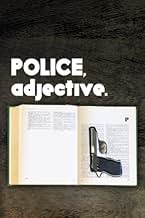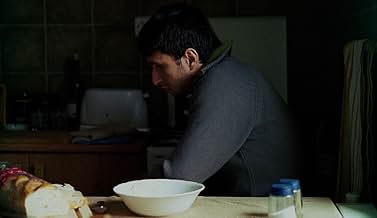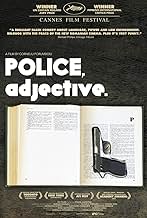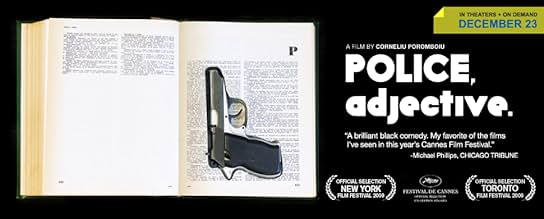NOTE IMDb
6,9/10
5,5 k
MA NOTE
Ajouter une intrigue dans votre langueA police officer refuses to arrest a young man for offering drugs to his friends.A police officer refuses to arrest a young man for offering drugs to his friends.A police officer refuses to arrest a young man for offering drugs to his friends.
- Réalisation
- Scénario
- Casting principal
- Récompenses
- 15 victoires et 15 nominations au total
George Remes
- Vali
- (as Remes George)
Constantin Dita
- Officer on Duty
- (as Costi Dita)
Avis à la une
I first watched this film about a year ago, and I struggled through it because it truly is one of the slowest and uneventful films you'll ever see, but It has grown on me a lot and isn't a film that you'll forget after seeing. The film deals with themes like guilt, responsibility, choice, patience, with some underlined political themes. Its one thing to conceptualize a film effectively but it's another to execute it correctly, and I think Corneliu Porumboiu did a very honorable job in both those departments. It's one of my favorite films, actually. there's a scene near the end of the film where the main character, one of his colleagues, and his boss are sitting in his office discussing the main character's struggle between the law and his own conscience. This scene goes on for close to 30 minutes if i remember correctly, and it's all done on one shot, with the exception of a few little overlapping shots to view the contents of a dictionary in the main character's hands. I was really impressed by that whole scene. Even if you don't love it, it's definitely worth at least one watch.
I recently saw "4 Months, 3 Weeks, 2 Days", about a woman's efforts to have an abortion in Nicolae Ceausescu's Romania. Now comes "Politist, adj." ("Police, Adjective" in English), Romania's submission to the Academy Awards as Best Foreign Language Film of 2009. This one looks at small-town cop Cristi (Dragos Bucur) assigned to investigate a boy smoking hashish, and how he begins to have misgivings about the ethical ramifications of the task.
What strikes me is how much this small town in Romania looks like Russia. Most of the buildings all have a very Eastern Bloc look. To be certain, there are a few scenes where Dragos goes to the boy's house in what appears to be a posher section of the town, with more modern-looking houses. Many of the scenes in the film are long shots, especially the scene where Cristi and his superior use the dictionary to debate the true meaning of conscience and other words.
I don't know if I would call this the greatest movie ever made, but I still recommend it. The scene where Cristi eats dinner while his wife has an obnoxious song playing on the computer really shows Cristi's break in terms of conscience, just because of how he reacts.
Anyway, I like to get to see cultures that we don't often see, and I really liked this movie. I hope that Romania gives us more like this.
What strikes me is how much this small town in Romania looks like Russia. Most of the buildings all have a very Eastern Bloc look. To be certain, there are a few scenes where Dragos goes to the boy's house in what appears to be a posher section of the town, with more modern-looking houses. Many of the scenes in the film are long shots, especially the scene where Cristi and his superior use the dictionary to debate the true meaning of conscience and other words.
I don't know if I would call this the greatest movie ever made, but I still recommend it. The scene where Cristi eats dinner while his wife has an obnoxious song playing on the computer really shows Cristi's break in terms of conscience, just because of how he reacts.
Anyway, I like to get to see cultures that we don't often see, and I really liked this movie. I hope that Romania gives us more like this.
In "Police, Adjective", Romanian director Corneliu Porumboiu devotes himself to the story of a small town cop reluctant of busting a minor for endorsing hashish with friends. Although vague at first, we learn that the civil police Cristi is having an unease conscience about nailing the young man, which may inflict seven years in prison for what Cristi believes to be a petty crime that will – soon enough – be looked upon more liberated. Throughout pic we follow his daily routines and interactions in the downbeat and austere town of Vaslui, including scenes of parodic bureaucracy and laudable lengthy takes.
"Police, Adjective" is admittedly in many ways difficult to interpret. The first half of the film deals with classic police work (classic as in reality, not classic as in previously depicted on film) including Cristi's pursuit of suspects and filing reports. For an audience used to clustered action flicks, this may seem as tedious and unbearable to endure. From a more objective perspective, I find it somewhat original and daring. This course of the film is harmless, it is on the contrary a certain, yet inevitable cul-de-sac initiated by a mere typo, that pushes it in a slightly too academic stand. On the other hand, it could also be considered an ironic twist when deciding how Cristi's moral dilemmas should be solved.
One of the more unfortunate aspects of Porumboiu's directing, in particular substantial for "Police, Adjective" but nonetheless equally visible in previous film "12:08 East of Bucharest", is that the (black) humor sometimes may appear so subtle that when juxtaposed to foreigners it can be completely lost (in translation.)
Watching Porumboiu's battle between an objective and supreme law versus Cristi's subjective conscientious law is evidently quite fascinating, despite being a bit too submissive at times.
"Police, Adjective" is admittedly in many ways difficult to interpret. The first half of the film deals with classic police work (classic as in reality, not classic as in previously depicted on film) including Cristi's pursuit of suspects and filing reports. For an audience used to clustered action flicks, this may seem as tedious and unbearable to endure. From a more objective perspective, I find it somewhat original and daring. This course of the film is harmless, it is on the contrary a certain, yet inevitable cul-de-sac initiated by a mere typo, that pushes it in a slightly too academic stand. On the other hand, it could also be considered an ironic twist when deciding how Cristi's moral dilemmas should be solved.
One of the more unfortunate aspects of Porumboiu's directing, in particular substantial for "Police, Adjective" but nonetheless equally visible in previous film "12:08 East of Bucharest", is that the (black) humor sometimes may appear so subtle that when juxtaposed to foreigners it can be completely lost (in translation.)
Watching Porumboiu's battle between an objective and supreme law versus Cristi's subjective conscientious law is evidently quite fascinating, despite being a bit too submissive at times.
This film is good... by contrast last night I watched Two Women with Sophia Loren (1960)...a film that had a veritable circus of characters none of which stayed with me more than 15 minutes.
I will remember Christi in this film for a long time. Yes it is slow at times especially the scene of them waiting in the office to see Christi's boss. And the dictionary sequence was tedious. But the pay off is you come to really know this character.
This is just the sort of film I like to stumble on.. something that stays with you. Distant (A Turkish film) is a similar slow moving film.
One actor has to carry this film entirely for almost two hours--it was a flawless performance by him.
I will remember Christi in this film for a long time. Yes it is slow at times especially the scene of them waiting in the office to see Christi's boss. And the dictionary sequence was tedious. But the pay off is you come to really know this character.
This is just the sort of film I like to stumble on.. something that stays with you. Distant (A Turkish film) is a similar slow moving film.
One actor has to carry this film entirely for almost two hours--it was a flawless performance by him.
One of the best movies of the year - and, definitely, of the Romanian cinema all over.
After "12:08: East of Bucharest" (aka "A fost sau n-a fost" - original title), Cornel Porumboiu does it again: an incisive and tender, empathic and ruthless look into our contemporary humanity. It brings back memories of Kafka's "Trial": the blind mechanism of Law, meant to help us live better and, because of so many machine-like people, turned into a device for destroying lives. In the role of the young policeman who loses his faith into the system, Dragos Bucur brings on screen another of his memorable performances - subtle, deep, finely tuned.
But the main virtue of this excellent movie, of course, is Cornel's directing - credible, original, precise. The static long shots, creating pent-up inner tensions... the unbearable waiting scenes, under a leaden sky... the discrete plastic compositions of the frame... the insidious rhythm... the careful attention to the minutest details - everything, with a due meaning and a perfectly weighted impact.
Special kudos for the pivotal scene built up around Mirabela Dauer's song "I Don't Leave You Love" - a rare piece of abstruse idiocy, used as a main axis for the protagonist's confrontation with the life's absolute absurdity. The scene is so masterfully built and shot, that it makes us scream laughing (in Cannes, the audience was delirious) - but the ultimate meaning is tragic... this being Porumboiu's definitory characteristic - as he said himself: "comical authors are often the saddest ones of all".
After "12:08: East of Bucharest" (aka "A fost sau n-a fost" - original title), Cornel Porumboiu does it again: an incisive and tender, empathic and ruthless look into our contemporary humanity. It brings back memories of Kafka's "Trial": the blind mechanism of Law, meant to help us live better and, because of so many machine-like people, turned into a device for destroying lives. In the role of the young policeman who loses his faith into the system, Dragos Bucur brings on screen another of his memorable performances - subtle, deep, finely tuned.
But the main virtue of this excellent movie, of course, is Cornel's directing - credible, original, precise. The static long shots, creating pent-up inner tensions... the unbearable waiting scenes, under a leaden sky... the discrete plastic compositions of the frame... the insidious rhythm... the careful attention to the minutest details - everything, with a due meaning and a perfectly weighted impact.
Special kudos for the pivotal scene built up around Mirabela Dauer's song "I Don't Leave You Love" - a rare piece of abstruse idiocy, used as a main axis for the protagonist's confrontation with the life's absolute absurdity. The scene is so masterfully built and shot, that it makes us scream laughing (in Cannes, the audience was delirious) - but the ultimate meaning is tragic... this being Porumboiu's definitory characteristic - as he said himself: "comical authors are often the saddest ones of all".
Le saviez-vous
- AnecdotesRomania's official submission to 82nd Academy Award's Foreign Language in 2010.
- Bandes originalesNu te parasesc iubire
Performed by Mirabela Dauer
Arranged by Dan Dimitriu
Lyrics by Dan Ioan Pantoiu
Produced by Roton Music
Played and discussed at Cristi's home
Meilleurs choix
Connectez-vous pour évaluer et suivre la liste de favoris afin de recevoir des recommandations personnalisées
- How long is Police, Adjective?Alimenté par Alexa
Détails
Box-office
- Budget
- 800 000 € (estimé)
- Montant brut aux États-Unis et au Canada
- 53 206 $US
- Week-end de sortie aux États-Unis et au Canada
- 19 452 $US
- 27 déc. 2009
- Montant brut mondial
- 162 974 $US
- Durée
- 1h 55min(115 min)
- Couleur
- Mixage
- Rapport de forme
- 1.85 : 1
Contribuer à cette page
Suggérer une modification ou ajouter du contenu manquant



























